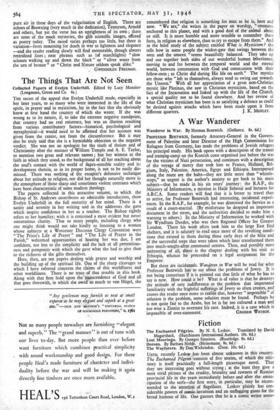The Things That Are Not Seen
Collected Papers of Evelyn Underhill. Edited by Lucy Menzies- (Longmans, Green and Co. 6s.)
THE secret of the appeal that Evelyn Underhill made, especially in her later years, to so many who were interested in the life of the spirit, in prayer and in mysticism, lay in the fact that she obviously knew at first hand the country of which she wrote. If she was wrong as to its nature, if, to take the extreme negative standpoint, that country had no real existence, but was an illusion resulting from various contributory factors—historical, psychological and metaphysical—it would need to be affirmed that her account was given from the centre, not from the circumference. But it may also be truly said that she is a formidable objection to the negative verdict. She was not an apologist for the truth of theism arid of Christianity after the manner of William Temple and A. E. Taylor, to mention two great and relevant names; but her witness to the faith in which they stood, as the background of all her teaching about the soul's contact with the world of ittpra-sensible reality and its development therein, as in its proper home, is not to be easily dis- missed. There was nothing of the escapist's defensive technique about her attitude to religion, nor did her thought naturally move in the atmosphere of those sharp and sometimes violent contrasts which have been characteristic of some modern theology.
The papers collected in this attractive volume, to which the Bishop of St. Andrews contributes an admirable introduction, show Evelyn Underhill in the full maturity of her mind. There is a sanity and serenity in her writing and in the addresses she gave which inspire confidence in her as a teacher. The Bishop rightly refers to her humility; with it is conjoined a most evident but never ostentatious charity. That so many people, including clergy, who one might think would not take kindly to listening to a woman whose subjects at a Worcester Diocesan Clergy Convention were "The Priest's Life of Prayer" and "The Life of Prayer in the Parish," welcomed opportunities of hearing her was due, I am confident, not less to the simplicity and the lack of all pretentious- ness and pomposity with which she gave what she had to give than to the richness of the gifts themselves.
Here, then, are ten papers dealing with prayer and worship and the building up of the spiritual life. One of the sharp cleavages to which I have referred concerns the claims of this worldliness and other worldliness. There is no trace of that trouble in this book. Along with that firm hold upon the transcendence of God and all that goes therewith, in which she owed so much to von Hugel, she remembered that religion is something for man as he is, here and now. "We are," she writes in the paper on worship, "creatures anchored to this planet, and with a good deal of the animal about us still. It is more humble and more sensible to remember these facts, in religion as elsewhere, than to try to escape from them." And in the brief study of the subject entitled What is Mysticism? she tells how in some people the wicket-gate that swings between the seen and the unseen "seems beautifully balanced. They take up and use together both sides of our wonderful human inheritance, moving to and fro between the temporal world and the eternal world, between communion with God and communion with their fellow-men; as Christ did during His life on earth." The mystics are those who "left to themselves, always tend to swing out towards the Unseen." With all her appreciation of a great non-Christian mystic like Plotinus, she saw in Christian mysticism, based on the fact of the Incarnation and linked up with the life of the Church. a special quality not to be found elsewhere. And her review of what Christian mysticism has been is as satisfying a defence as could be desired against attacks which have been made upon it from different quarters. J. K. MOZLEY.






























 Previous page
Previous page